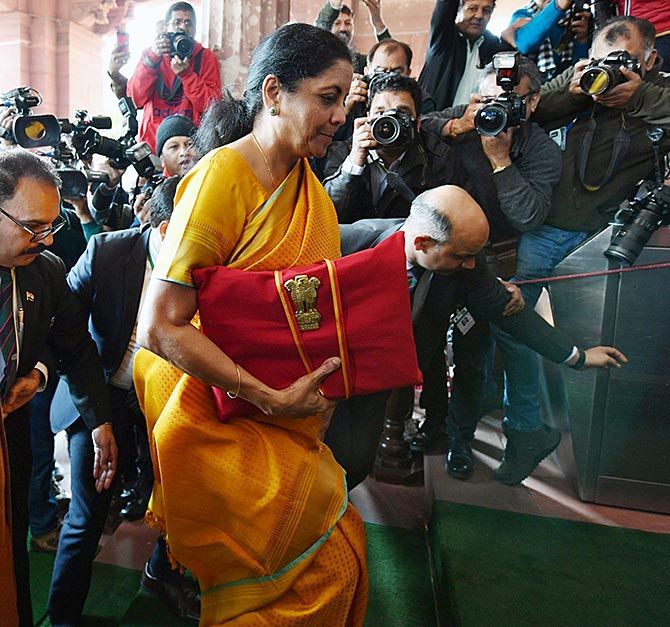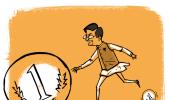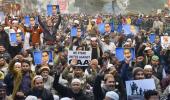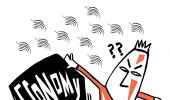'The global corporates are concerned: You used to have policy predictability, now it's a yo-yo.'
'New taxes and regulations pop up, some disappear soon, many linger.'
'And now the return of old Socialist fixations such as import-substitution, swadeshi, small-trader mercantilist ideology.'
'On top of all that, your ministers admonish us,' points out Shekhar Gupta.

Brand India -- and Brand Modi -- has been damaged by a combination of identity politics and economic decline. But the world isn't writing India off, not yet
Is the world always conspiring to pull India down?
Are the big powers, especially in the democratic West, fearful of India’s rise?
Is there, to use a term fashionable among the faithful lately, a Christo-Islamic plot against the rise of a Hindu India?
Does the rest of the world hold India and other countries, say, China, to different standards?
All of the above are untrue, except the last and for that there is a reason: The size and dynamism of China's economy. The truth is, for seven decades now, almost all of the rest of the world, has wanted India to succeed.
Barring traditional adversaries Pakistan and China, it is difficult to name a nation that didn't wish India well, or benefits from its failure. This, despite the fact that we've by now built a chronic habit of raising expectations every decade or so, and letting ourselves, and our global admirers down. That, precisely, is the mood right now.
India's economic stall is a setback indeed. The bigger problem, however, is the precipitous fall of its moral stature, with struggling social indicators, falling rankings on democracy and corruption scales, spontaneous, peaceful nation-wide protests against the CAA/NRC, and an establishment discourse that is getting angry, vengeful, and exclusivist by the day.
In three decades of Davos since the Cold War, whether or not India was among the flavours of the season, it was always looked at with a sense of expectation, and awe at the growing ease with which it was able to manage its diversity, change governments democratically, globalise its thinking, economically and strategically.
These three decades have seen the world rocked by several major crises precisely because of the failure of many other countries and regions to do precisely this, from the Balkans to West Asia to pockets in Africa.
India's economy grew in the post-1991 phase impressively and that further enhanced Brand India. Look at this chaotic country that becomes socially and politically more stable by the year, and is now one of the engines of global growth.
China kept way ahead of India, but it wasn’t setting an example with its authoritarian, political economy that anyone wanted to, or afford to follow. Not even Putin's Russia and the Ayatollahs's Iran.
India was the opposite. An inspirational example to the rest of the world that big, diverse nations could grow not 'in spite of' democracy, but because of it.
Imagine if a nation as diverse as India did not have its liberal, democratic, inclusive political and social culture, where would it end up?
It could break up like the Soviet Union, Yugoslavia, or West Asia. Or go the authoritarian way of Russia, Turkey, and China.
A growing and increasingly secure and stable India, with its poverty, diversity and a million problems was a valuable ambassador for democracy and liberalism.
That, unfortunately, is under threat now.
India's friends and fans of decades now look askance at us. The question you heard most often is, so what is going on in India?
Is it going to get worse? How did you get here?
No one, no foreign power, political, corporate, or opinion leader is celebrating India's stall. But the alarmed SOS, particularly from our friends, is: India, we have a problem.
We are not at a stage which you could describe as fall from grace. Not yet. Because our friends are also incorrigible optimists, and inured to the idea of India flattering to deceive every now and then.
They draw comfort from what they see as a brave pushback from at least some of India's institutions, occasionally even the judiciary and some media, the youth and of course -- I say it bracing for the consequences -- widespread protests by women, students, and the Muslims.
The message you hear often: You have problems. But in which other country, in such an environment, you would still have men and women, Muslim and Hindu, gathering in the streets, reading the Preamble to their Constitution.
One instinctive hyper-nationalist counter to this would be, oh, what else would you hear if only people you are talking to are like yourselves: Editors, woolly-headed intellectuals, and, that favourite slur, Left-liberal. You would expect them to detest India's first democratically elected government of the Hindu Right.
Two things need to be underlined, however. First, people in this category have traditionally been the biggest Indophiles. They've also been in the forefront of hailing India's post-1991 rise, and back its battle with terrorism emanating from Pakistan. In these decades they've treated Pakistan as a global migraine, university of jihad, a classical nuisance State.
Today they watch in silent bemusement as Imran Khan grandly compares India going the way of Germany in the 1930s under the Nazis. They don't agree, nor would they wish it were true. But they don't know how to defend India. They exchange stories of visa troubles for academics and journalists, pressures on media, and ask why India is acting like China.
And second, it isn't just the intellectual/policy/media universe that is abuzz with these new doubts. The global corporates too are concerned: You used to have policy predictability, now it's a yo-yo.
New taxes and regulations pop up, some disappear soon, many linger.
Your tax and regulatory processes, and, top of it, all your judiciary are muddled, and now the return of old Socialist fixations such as import-substitution, swadeshi, small-trader mercantilist ideology.
On top of all that, your ministers admonish us. In short, in one sense or the other, most see India's transformation into a prickly State. They don't like it.
The next counter would perhaps be the one of the obsolescence of soft power and the rise of hard power instead. That a new history began post-2014 and this India doesn't bend over backwards to please others. We run into two problems again.
First, you could make that transition if you had built that kind of hard power in the first place. Those who know better in the international strategic community, and are not impressed by our news TV channels, know that while the post-Pulwama February 26/27 action demonstrated a hard resolve on India's part to retaliate and risk escalation, the lack of capability to deliver a decisive, unilateral punishment on a much smaller power like Pakistan was severely exposed.
India, therefore, is getting caught up in its own rhetoric to prematurely declare itself as a new hard power while giving up what its strength was so far. The message: There are perils in flaunting something when you haven’t got it.
And second, as any marketing person would tell you, all brands, including nations, have some essential brand attributes.
For China it is a hard State, uncluttered, efficient governance, ethnic homogeneity, a superpower's military and the 'distinction' of carrying out the largest number of executions in the world each year and also keeping it a State secret.
For Pakistan, our favourite reference point these days, we'd rather not even talk. But India's core brand attributes are democracy, ease of living with diversity, a chaotic, cluttered but inclusive governance, and an argumentative, opinionated society.
And it's by no means a soft State. It can't be, if it is the only large, diverse, State to emerge after World War II to not only stay intact, but emerge stronger. All others, from the Soviet Union to Pakistan, the hardest of hard states, broke up.
We can dismiss it all as Western prejudice towards India, and especially with Hinduism. It won't change the fact that a combination of identity politics and economic decline has severely damaged Brand India.
Collaterally, it has dented Brand Modi as well. We need to take a deep breath, whisper mea culpa, and start repairs.
Of course, we can always say, do we care. At 4.8% growth and highest unemployment in 45 years, it simply won't work.
By special arrangement with The Print











